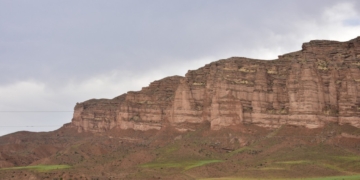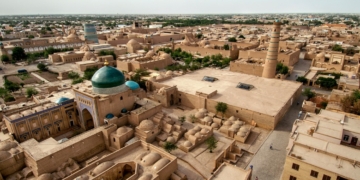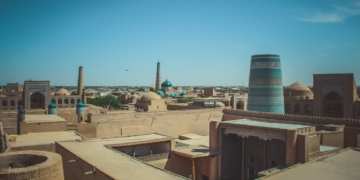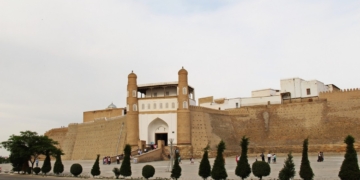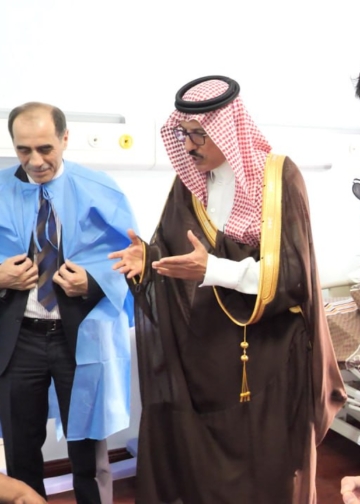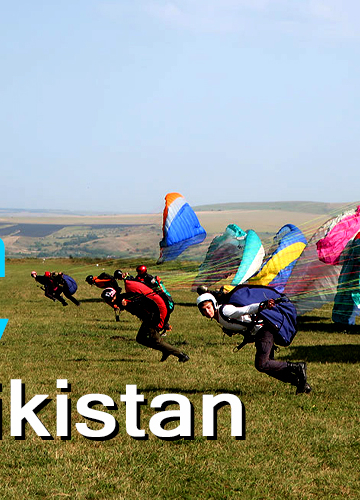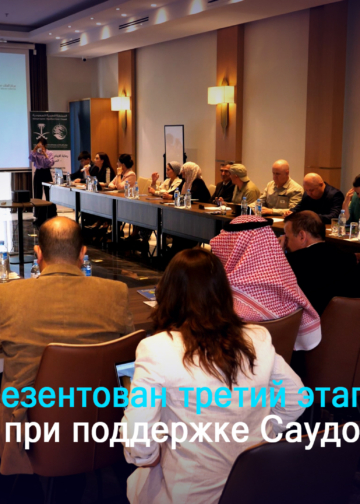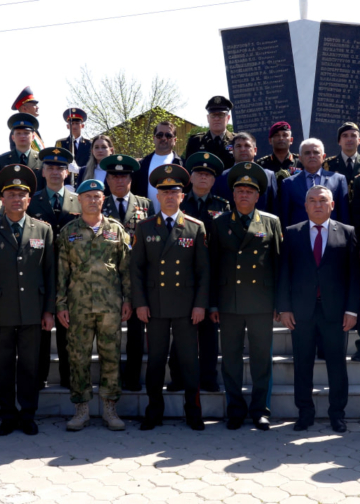id: 114536
date: 7/6/2007 9:29
refid: 07DUSHANBE1031
origin: Embassy Dushanbe
classification: UNCLASSIFIED
destination:
header:
VZCZCXRO4776
PP RUEHLN RUEHVK RUEHYG
DE RUEHDBU #1031/01 1870929
ZNR UUUUU ZZH
P R 060929Z JUL 07
FM AMEMBASSY DUSHANBE
TO RUEHC/SECSTATE WASHDC PRIORITY 0617
INFO RUEHAK/AMEMBASSY ANKARA 2008
RUEHBJ/AMEMBASSY BEIJING 1966
RUEHRL/AMEMBASSY BERLIN 1891
RUEHBS/USEU BRUSSELS 1233
RUEAIIA/CIA WASHDC
RUCNCIS/CIS COLLECTIVE
RUEATRS/DEPT OF TREASURY WASHINGTON DC
RHEFDIA/DIA WASHINGTON DC
RUEHDBU/AMEMBASSY DUSHANBE 2415
RHMFIUU/HQ USCENTCOM MACDILL AFB FL
RHMFISS/HQ USEUCOM VAIHINGEN GE
RUEHIL/AMEMBASSY ISLAMABAD 2186
RUEHBUL/AMEMBASSY KABUL 2176
RUEHLO/AMEMBASSY LONDON 1823
RUEHML/AMEMBASSY MANILA 0163
RUEHNE/AMEMBASSY NEW DELHI 2145
RHEHAAA/NSC WASHINGTON DC
RUEHFR/AMEMBASSY PARIS 1616
RUEKJCS/SECDEF WASHDC
RUEHKO/AMEMBASSY TOKYO 1639
RUEHNO/USMISSION USNATO 1782
RUEHVEN/USMISSION USOSCE 1992
RUCNDT/USMISSION USUN NEW YORK NY
RUCPDOC/USDOC WASHDC 0172
—————— header ends —————-
UNCLAS SECTION 01 OF 03 DUSHANBE 001031
SIPDIS
SIPDIS
STATE FOR SCA/CEN, DOC FOR ITA/MAC/EHOUSE
E.O. 12958: N/A
TAGS: ECON, ETRD, PGOV, PREL, TI
SUBJECT: AFGHAN VIEWS FROM NORTH OF THE BORDER: PROSPECTS FOR
TAJIK-AFGHAN TRADE
DUSHANBE 00001031 001.2 OF 003
1. Summary. Not far from the nearly-completed U.S.-funded
Nizhniy Pyanj bridge at the Tajik-Afghan border, Afghan traders
ferry goods from Pakistan, China, and Iran into southern
Tajikistan. The opening of the
Nizhniy Pyanj bridge will open
the door for more trade while decreasing the opportunity for
corruption at the border.
However, Afghan officials worry that
Tajik restrictions on Afghan businesspeople will limit potential
economic development. The United
States can help facilitate
Tajik-Afghan dialogue to resolve some of these issues. End
Summary.
At the Ferry Crossing
——————————-
2. Businessmen wait in the shade
at the lazy ferry crossing on
a hot and dusty afternoon. Tajiks
run the ferry, and charge
$110 per truck to cross the river from Afghanistan, while trucks
leaving Tajikistan pay only $60.
The ferry runs three times a
day, carrying six trucks each way hauling food, construction
materials, and medical supplies.
During the summer, as prices
of goods within Tajikistan rise, trucks often return to
Afghanistan empty.
3. One Tajik businessman,
«Muhabbat,» showed EconOffs ten
trucks packed high with Pakistani cement. He had been waiting
two days for a Tajik standards official to take a sample of the
cement 200 km to Dushanbe, certify its quality, and return with
a certificate so he could haul the load into Tajikistan. (Note:
TojikStandart is the government
agency charged with regulating
standards for all products and services in Tajikistan. End
Note.) A major housing and office
construction boom and several
major infrastructure projects have driven up the demand for
cement and the monopoly state-owned construction company
Tajikcement is failing miserably to keep up. This summer,
cement prices have tripled, and local customers have flocked to
the lower quality Pakistani cement to fill their needs.
4. Muhabbat, despite close family
connections to President
Rahmon, has to negotiate with the border guards, customs, the
sanitary service, and state standards agency on each
transaction. Once, Muhabbat
dumped ten tons of eggs into the
river after waiting for a week for the standards agency to
certify his goods. Customs officials
charged another importer
$18,000 to import twenty tons of meat into Tajikistan, a 100%
customs duty. Without storage
facilities on either side of the
border, transporting perishable goods is risky.
5. Still, some trade is
fruitful. Tajik businesspeople pay $3
per 14 kilogram crate of mandarins in Afghanistan, and sell
these crates for $20 on the Tajik market. According to the
Tajik Customs Committee, over $6 million in goods crossed the
ferry at Nizhniy Pyanj in 2006 — $3.5 million imports to
Tajikistan, and $2.5 million in exports.
Unofficial trade is
likely even higher.
Help for the Border Towns
—————————————
6. The Tajik border region of
Kumsangir has much to gain from
improved infrastructure and relaxed trade restrictions. Most
trucks skip over the region’s 4,500 citizens on their way to
Dushanbe. Besides lemons and
produce that local entrepreneurs
take up to Dushanbe, one sees little evidence of economic
activity. Kumsangir gets
electricity five months of the year;
and the government closes the water channel from the Vakhsh
river, leaving residents without water from November to April as
DUSHANBE 00001031 002.2 OF 003
well. The government provided
little assistance after an
earthquake last year rattled the mud-built walls of the city’s
buildings. (Note: The U.S.
Government provided emergency
supplies and $50,000 in housing assistance. End note.)
7. Further north in the small
city of Kolkhozobad, home to
140,000 people, between Dushanbe and the Nizhniy Pyanj bridge,
business owners explained that they lack capital to start and
expand their businesses. Tajik
and Afghan businessmen described
concern over a 2002 Tajik governmental decree which regulates
the types of goods allowed for export/import with Afghanistan,
limiting expansion of trade with Afghanistan. Businesspeople in
both districts told EconOffs that they receive many products
from Afghanistan, and they believe the Nizhniy Pyanj bridge will
provide new opportunities for trade.
Governor of Kunduz
——————————
8. In Kolkhozobad, EmbOffs
happened upon Muhammad Omar
Sulaimoni, governor of Kunduz province of Afghanistan, and Abdul
Jafar Sadeed, head of the international department, at the
Afghan Ministry of Foreign Affairs branch in Kunduz. The
governor was having lunch at the house of Dilbar Nurmatova, the
head of the non-governmental organization Sapeda, which is
implementing a State Department Business Facilitation Incentive
Fund project on cross-border trade.
Declining the vodka toasts
traditional in Tajikistan but not common in Afghanistan,
Sulaimoni explained the troubles Afghans are having with their
northern neighbor.
9. Sulaimoni complained about the
unfair treatment Afghan
traders receive in Tajikistan.
Tajiks see in every Afghan a
potential terrorist and drug dealer, he explained. The Afghan
governor pointed out that Afghanistan accepted Tajik civil war
refugees in the 1990s, allowing them to live in Kunduz, set up
businesses, buy land and property, and get married. According
to Sulaimoni, Tajiks distrust Afghans who come to Tajikistan
only to do business, treating them rudely at the border, and
delaying the visa process.
Tajikistan and Afghanistan do not
have a transit agreement, and Tajikistan does not allow Afghan
vehicles to cross the Tajik border.
Businesspeople therefore
use Tajik trucks for all cross-border trade.
10. Sulaimoni explained that last
year Tajikistan offered to
open a consular office in Kunduz so Afghans would not have to
travel to Kabul to receive visas.
He claims that the Afghan
side set up the office, provided security guarantees to the
Tajiks, and settled all administrative issues, while the Tajiks
have done nothing to move forward.
According to Sulaimoni, the
Tajik consular office in Kabul is waiting for their superiors in
Dushanbe to act, and the Afghans have not had luck pushing the
Ministry of Foreign Affairs here.
11. In Dushanbe, Dr. Atta
Ghaznawi, the Afghan trade
representative to Tajikistan (and U.S. green card holder),
supported Sulaimoni’s points, noting that the Ministry of
Foreign Affairs has ignored his letters for months. Recently,
when the Afghan government requested visas for 15 Afghan
businesspeople to attend a trade show in Eastern Tajikistan, the
Tajik government flatly refused visas for the entire group.
After the Tajik Consul insulted these businesspeople and kicked
them out of the Tajik Embassy in Kabul, the group sent a letter
of complaint to the Afghan-American Chamber of Commerce urging
Afghan businesspeople to boycott trade with Tajikistan.
DUSHANBE 00001031 003.2 OF 003
Bringing Tajiks and Afghans Together
——————————————— ———
12. Non-governmental
organizations help bridge the gap between
these two countries with historical and cultural ties by
supporting businesspeople who typically lack knowledge of their
rights and have no recourse against corrupt officials. With
U.S. support, non-governmental organization Sapeda will publish
a brochure explaining key laws and regulations on Tajik-Afghan
trade issues. Sapeda conducted
training in Afghanistan in
cooperation with the International Labor Organization on how to
start up a small business. Sapeda
would like to translate its
Tajik language training brochures into Dari/Farsi, even though
they estimate that over 95% of individuals in Kunduz cannot read
or write. Sapeda requested U.S.
support for establishing an
information resource center at the border to assist traders at
the new bridge site. In September
2007, Sapeda will organize a
cross-border trade exhibition in Kunduz province.
13. The U.S. government can also
play a useful role as direct
facilitator between Tajikistan and Afghanistan to improve
dialogue on economic relations.
Ghaznawi requested U.S. support
for the Tajik-Afghan Chamber of Commerce, to showcase the
potential for trade between the two countries. He also noted
the difficulty he is having with the Tajik Ministry of Foreign
Affairs, and suggested that we could help engage the Tajik
government on what he sees as simple good business.
14. Securing the Tajik-Afghan
border by training and equipping
customs and border officials will help alleviate Tajik concerns.
Ghaznawi feels that beyond
security concerns, Tajiks choose to
limit trade in order to line their own pockets. Ghaznawi
recognizes the need for a strong border and the ability to keep
narcotics out of Tajikistan, but does not see why this should
interfere with trade that benefits both sides. The Tajiks need
to engage in constructive dialogue and move beyond general
statements of historical friendship if they are going to take
advantage of the $36 million Nizhniy Pyanj bridge.
15. Comment: Tajikistan and Afghanistan should be natural
trading partners, but it may take some confidence building steps
to erase the Tajiks’ bias against the Afghans. Post is aware
from its own discussions with Tajik officials of the distrust of
Afghans — including Foreign Minister Zarifi’s June 20 assertion
to the Ambassador that «Afghans want to be in Tajikistan only
for drug trading.» Post
will act on Ghaznawi’s request to
facilitate a more direct conversation between Afghan and Tajik
trade representatives, and the Tajik Ministry of Foreign
Affairs, perhaps starting with the incoming head of the Consular
Department of the Foreign Ministry.
The opening of the bridge
will provide an excellent opportunity for post, and high-level
visitors to reinforce this message.
End Comment.
JACOBSON
=======================CABLE ENDS============================
id: 114730
date: 7/9/2007 9:40
refid: 07DUSHANBE1046
origin: Embassy Dushanbe
classification: UNCLASSIFIED
destination:
header:
VZCZCXRO6473
RR RUEHLN RUEHVK RUEHYG
DE RUEHDBU #1046/01 1900940
ZNR UUUUU ZZH
R 090940Z JUL 07
FM AMEMBASSY DUSHANBE
TO RUEHC/SECSTATE WASHDC 0633
INFO RUEAIIA/CIA WASHDC
RUCNCIS/CIS COLLECTIVE
RHEFDIA/DIA WASHINGTON DC
RUEHDBU/AMEMBASSY DUSHANBE 2434
RUEHIL/AMEMBASSY ISLAMABAD 2189
RUEHBUL/AMEMBASSY KABUL 2179
RUEHNE/AMEMBASSY NEW DELHI 2148
RHEHAAA/NSC WASHINGTON DC
RUEHVEN/USMISSION USOSCE 1995
RUCPDOC/USDOC WASHDC 0175
—————— header ends —————-
UNCLAS SECTION 01 OF 02 DUSHANBE 001046
SIPDIS
SIPDIS
STATE FOR EEB/CBA
STATE FOR SCA/CEN
STATE FOR EEB/EX
E.O. 12958: N/A
TAGS: AFIN, BEXP, BTIO, ECON, TI, EINV, ETRD, ADPM
SUBJECT: FY07 BFIF REPORTING FROM DUSHANBE
REF: REF A: STATE 087036; REF B: DUSHANBE 690
DUSHANBE 00001046 001.2 OF 002
1. Embassy Dushanbe submits the
following report per Ref A
regarding participation in the Business Facilitation Incentive
Fund (BFIF) program. Post thanks
the Economic Bureau for its
support for these two successful programs.
2. Dushanbe — Regional
Transportation Infrastructure Conference
BFIF contribution: $2,000
Amount disbursed: $2,000
Budget breakdown:
$500 for conference facility rental
$1,000 for interpretation
$500 for in-country transportation expenses
BFIF funds contributed to the Central Asian Transportation
Infrastructure Conference in Dushanbe May 7, sponsored by the
U.S. Department of Commerce along with Embassy Dushanbe. The
conference provided an opportunity for Central Asian transport
representatives to discuss their accomplishments and challenges
within their respective transport sectors, along with the
potential for future cooperation and growth. Representatives
from Tajikistan, Afghanistan, Kyrgyzstan and Kazakhstan focused
on improving aviation and road construction to integrate Central
and South Asia. The high level of
participation — more than 80
attendees — demonstrated the desire for economic integration in
the region and building/renovating roads between Kazakhstan and
Karachi.
Department of Commerce Deputy Assistant Secretary for Europe
Paul Dyck opened the conference by explaining the U.S.
government desire to expand U.S. trade links with Central Asia,
while reducing trade and investment barriers through initiatives
such as the Central Asia Trade and Investment Framework
Agreement. He also highlighted
our mutual goal to create a
regional electricity market, improve customs regimes and border
security, and integrate telecom systems.
A representative from
Caterpillar made a presentation on their products to the
audience, with potential sales leads.
Continued U.S. support for development and reform in the Central
Asian transportation sector remains necessary to keep the
dialogue going. This conference
demonstrated that regional
leaders share the goals of Central and South Asian regional
integration, and are actively working towards them.
3. Dushanbe — Tajik-Afghan Cross
Border Trade
BFIF contribution: $9,500
Amount disbursed: $1,956
Detailed budget breakdown of costs incurred May 2 — June 2:
Salary 56
Honoraria 220
Taxes 116
Communications 84
Stationary 100
Seminar costs 1,380
————-
Total
1,956
The Eurasia Foundation of Central Asia, through its sub-grantee
non-governmental organization «Sapeda», has conducted a series
of seminars for businesspeople in the border areas of Tajikistan
and Afghanistan in the vicinity of the U.S.-funded Nizhniy Pyanj
bridge that will open in August.
Over 480 people attended the
seminars that will increase the possibility for cross-border
trade. Sapeda will complete a
legal manual in Tajik and Dari
for government officials and entrepreneurs, and the project will
culminate in a trade fair in September.
The project builds on the success of two previous cross-border
partnership projects implemented by Sapeda and the Eurasia
Foundation and will help small businesses and farmers on both
sides realize their trade potential by seeking to eliminate
administrative barriers across the border. Bolstering
cross-border trade and small and medium enterprises fits with
Embassy Kabul’s and Embassy Dushanbe’s mission priorities of
DUSHANBE 00001046 002.2 OF 002
economic development and regional trade.
The project gets to
the heart of regional economic integration by building capacity
on both sides that could lead to increased markets for U.S.
products and equipment.
JACOBSON
=======================CABLE ENDS============================
id: 114862
date: 7/10/2007 7:55
refid: 07DUSHANBE1051
origin: Embassy Dushanbe
classification: UNCLASSIFIED//FOR OFFICIAL USE ONLY
destination:
header:
VZCZCXRO7706
RR RUEHLN RUEHVK RUEHYG
DE RUEHDBU #1051/01 1910755
ZNR UUUUU ZZH
R 100755Z JUL 07
FM AMEMBASSY DUSHANBE
TO RUEHC/SECSTATE WASHDC 0639
INFO RUCNCIS/CIS COLLECTIVE
RUEAIIA/CIA WASHDC
RUEHBUL/AMEMBASSY KABUL 2181
RUEHIL/AMEMBASSY ISLAMABAD 2191
RUEHNE/AMEMBASSY NEW DELHI 2150
RUEHVEN/USMISSION USOSCE 1997
RUEHBS/USEU BRUSSELS 1236
RUCNDT/USMISSION USUN NEW YORK 1469
RUEHDBU/AMEMBASSY DUSHANBE 2440
—————— header ends —————-
UNCLAS SECTION 01 OF 02 DUSHANBE 001051
SIPDIS
SENSITIVE
SIPDIS
STATE FOR SCA/CEN
E.O. 12958: N/A
TAGS: PGOV, PHUM, KDEM, TI
SUBJECT: NEW TV STATION AIRS AS MEDIA ENVIRONMENT CONTINUES TO
DETERIORATE
DUSHANBE 00001051 001.2 OF 002
1. (U) Tajikistan’s new «Simoi Mustaqili
Tojikiston» or
«Independent Television of Tajikistan» is a mysterious private
television company which started broadcasting in June 2007. The
station reportedly broadcasts to Dushanbe and surrounding areas
daily for two hours in the morning and for six hours in the
evening, but most Embassy contacts report that they have not
managed to catch any programs since it went on the air. Voris
Nazar, Deputy Director of Independent Television of Tajikistan
explained to PolOff June 22 that the station’s programming will
consist of documentaries as well as news and cultural shows.
2. (U) The station’s director is Zinatullo Ismoilov,
the
former assistant to the chairman of the Committee on Television
and Radio. Independent Television
of Tajikistan managed to
obtain a broadcasting license on September 20, 2006. Other
non-state radio and television stations have a difficult time
obtaining broadcasting licenses and the committee usually
explains that it will not issue any new licenses until a new law
governing broadcasting regulations is passed. (Note: The
U.S.-funded Internews community radio stations have faced this
kind bureaucratic stonewalling over the last 12 months. End
Note.) Nazar refused to explain
who founded and funds
Independent Television of Tajikistan and how the station managed
to receive a broadcasting license.
3. (SBU) In a series of meetings with PolOff July 2-5,
local
journalists and media representatives were skeptical that the
new station could be characterized as truly «independent.»
Although none could definitively identify the station’s
financier or supporter, two names surfaced frequently: Hasan
Sadulloev, Chairman of Orionbank, and Murodali Alimardanov,
Chairman of the National Bank.
Both men are well connected and
influential enough to pull strings at the Committee on
Television and Radio. Both also
have sufficient wealth to fund
the station’s start-up costs.
THE POWER OF TELEVISION
4. (SBU) Why would Sadulloev or Alimardanov want to
start his
own television company? Saodat
Anvarova, Country Director of
the Institute for War and Peace Reporting, explained that
television advertising revenue is profitable. Another embassy
source hypothesizes that the financier is actually putting
himself in a strategic position to run for political office in
the future. Television is able to
reach a wider audience than
print media. However, most Tajiks
spend little time watching
the state-owned television programming which is inundated with
news and video clips of President Rahmon. Because of this,
local viewers turn to more entertaining satellite television,
mostly from Russia. Tajik towns
bordering Uzbekistan receive
Uzbek television feeds. Anvarova
recounted a media report of a
little boy in Turson-zade, a Tajik town near the Uzbek border,
who when asked who his president is, replied «Karimov» — the
Uzbek president.
5. (SBU) Sources point out that regardless of who is
the
founder of Independent Television of Tajikistan, it enjoys the
government’s blessing. Some
suggest the station itself may have
been created by the government in order to give the appearance
that media freedom is improving.
THE DECLINE OF PRINT MEDIA
6. (U) Print media is unfortunately not as
profitable as
television, and since the fall of the Soviet Union, newspaper
circulation has dropped precipitously.
Language barriers and
illiteracy, together with the end of mandatory student
subscriptions and subsidized printing and transportation, have
contributed to the decline of print media. Small papers that
report on politics, such as Nigoh, have problems attracting
advertisers. Nigoh’s
Editor-in-Chief, Nurali Davlatov,
estimates that in order for the paper to be profitable it needs
to distribute more than 10,000 copies.
Distribution, in turn,
presents its own problems.
Tajikistan’s mountains and poor
transportation infrastructure prohibit widespread distribution
of any one national paper.
Khurshed Atoulloev of Faraj
newspaper estimates that 60 percent of the rural population only
speaks Tajiki, and the larger newspapers such as Asia-Plus or
Avesta’s Fakti i Kommentarii are published in Russian. He says
that television appeals to people more because «they just have
to sit and watch it.»
DUSHANBE 00001051 002.2 OF 002
7. (U) Davlatov said that the quality of journalism
overall
has declined. The new generation
of journalists trained after
the fall of the Soviet Union are inadequately skilled at
reporting and investigative journalism.
After independence and
especially after the start of the civil war, the education
system in Tajikistan suffered when Russian professionals
including teachers left the country en masse, resulting in a
poorly-educated young population.
Davlatov sighed when he noted
that Tajiks no longer consider journalism a prestigious
profession. Tajik journalists
also practice self-censorship,
and many are not fully aware of Tajik laws ensuring limited
freedom of expression. This means
that law enforcement will
often take advantage of the general lack of knowledge about
press freedom and punish journalists who push the envelope.
MEDIA FREEDOM CONTINUES TO DETERIORATE
8. (SBU) Journalists and media professionals say media
freedom
has deteriorated since the November 2006 presidential election.
In addition to censoring themselves, many journalists respect
the unwritten rules such as not criticizing government policy or
the president’s inner circle.
(Note: Tajikistan’s criminal code
article 137 forbids offending or slandering the president. End
Note.) City officials use excuses to threaten media
organizations such as accusing them of not paying taxes or the
electricity bill. Immediately
prior to the presidential
election, some «opposition» and information internet websites
were blocked. Nuriddin Qarshiboev
of the National Association
of Independent Mass Media in Tajikistan reported that in late
June parliament passed eight amendments restricting internet
freedom. Parliament sources have
confirmed this, and post is
attempting to find copies of the passed legislation.
9. (SBU) Based on our recent discussions, most Tajik
journalists agree that the following changes are needed to
foster a freer media environment and increase public access to
independent news sources:
— An independent printing press.
The largest publishing house
in Tajikistan is state-run and other smaller private printing
presses simply will not print controversial material.
— A private distribution company to reliably distribute and
sell the newspapers instead of relying on individual street
vendors. Newspaper owners say
that the Tajik postal system is
too expensive and unreliable.
— Increased transparency of the Committee on Television and
Radio, and particularly the Commission on Broadcasting and
Licensing within the committee.
Media sources say the committee
is considering changing the regulations to categorize frequency
waves as state secrets which would make it more difficult for
media organizations to apply for frequency waves to broadcast.
— A government strategy for developing the mass media industry
in Tajikistan. The current
technique of imposing legislation in
an attempt to regulate the industry ends up restricting media
freedom.
10. (SBU) Two other large-scale
improvements to support media
freedom include:
— Improved infrastructure links to enable news to reach remote
regions; and
— Constant electricity to allow people to watch television or
access internet more often.
11. (SBU) COMMENT:
Independent Television of Tajikistan may
not be completely independent, but it is a privately run
station. If the station succeeds
commercially, it may spur
other investors to consider opening media outlets to create a
stronger industry that can stand up to government pressure.
However, the government’s watchful eye and heavy hand on the
media even after the presidential election is concerning. Short
of a reversal of the government’s heavy -handed policies to keep
journalists scared and timid, Tajikistan’s electronic media will
likely not become a source of independent news or open debate.
Similarly, in an age of declining literacy rates and increased
government scrutiny, it is unlikely Tajikistan’s print media
will flourish. END COMMENT.
JACOBSON
=======================CABLE ENDS============================
id: 115007
date: 7/11/2007 10:47
refid: 07DUSHANBE1056
origin: Embassy Dushanbe
classification: UNCLASSIFIED//FOR OFFICIAL USE ONLY
destination: 07DUSHANBE1056|07DUSHANBE623|07DUSHANBE790
header:
VZCZCXRO9099
RR RUEHLN RUEHVK RUEHYG
DE RUEHDBU #1056/01 1921047
ZNR UUUUU ZZH
R 111047Z JUL 07
FM AMEMBASSY DUSHANBE
TO RUEHC/SECSTATE WASHDC 0648
INFO RUCNCIS/CIS COLLECTIVE
RUEHBUL/AMEMBASSY KABUL 2183
RUEHNE/AMEMBASSY NEW DELHI 2152
RUEHIL/AMEMBASSY ISLAMABAD 2193
RUCNDT/USMISSION USUN NEW YORK 1471
RUEHVEN/USMISSION USOSCE 1999
RUEHDBU/AMEMBASSY DUSHANBE 2449
—————— header ends —————-
UNCLAS SECTION 01 OF 02 DUSHANBE 001056
SIPDIS
SENSITIVE
SIPDIS
STATE FOR SCA/CEN, DRL
E.O. 12958: N/A
TAGS: PGOV, PREL, PHUM, KIRF, TI
SUBJECT: JEHOVAH’S WITNESSES FIGHTING TO IMPORT LITERATURE UNDER
TAJIK LAW
REF: A) DUSHANBE 790 B) DUSHANBE 623
DUSHANBE 00001056 001.2 OF 002
1. (SBU) Summary: Jehovah’s
Witness Associate Counsel Gregory
Olds expressed concern that that Customs officials’ recent
seizure of a shipment of his organization’s religious literature
represents a worrying shift in the Tajik government’s attitude
towards religious freedom and censorship. During his July 10
meeting with Ambassador and PolOff, Olds noted that whereas the
Customs Service previously complied with well-publicized
restrictions on the import of pornography and other
objectionable material, there now appears to be a more nebulous,
cumbersome and arbitrary system in place — demanding the
affirmative approval of the Ministry of Culture that individual
materials are suitable for dissemination in Tajikistan. Kiril
Kulikov, a Russian lawyer for Jehovah’s Witness handling the
organization’s legal action against the Tajik Customs Service,
provided an overview of ongoing court proceedings in Dushanbe.
End Summary
2. (SBU) Background: When a shipment of Jehovah’s Witness
religious literature arrived in Tajikistan April 17, customs
officials determined that the organization did not have
permission from the Department of Religious Affairs under the
Ministry of Culture to import the materials and seized the
shipment. (Reftel A). Samples
went to the Ministry of Culture
for «expert study» in order to verify their conformance with
Tajik laws. This study —
which the ministry has not released —
allegedly found the materials to
be illegal, and prompted the
State Committee on National Security to request that the
offending shipment be transported out of the country.
WORKING WITHIN THE SYSTEM
3. (SBU) Olds conveyed his organization’s respect for
the
right of any sovereign nation to regulate the import of
pornographic and other offensive materials. However, he also
emphasized that a censorship campaign actively targeting
Jehovah’s Witness members and activities would not be met by
meek acquiescence. Therefore, his
organization is responding
through both political and legal channels in Tajikistan.
4. (SBU) On the political front,
Olds has come to Dushanbe from
Jehovah’s Witness headquarters in New York to raise awareness
among diplomatic missions of the freedom of religion issues at
stake, and to attempt to meet with high-level Tajik officials to
resolve the issue. Sensing that
the seized shipment may have
raised eyebrows in part due to its large size (approximately
five tons), Olds noted that he was authorized to negotiate with
Tajik authorities on the volume of literature and other
materials imported by his organization.
In addition, Olds
expressed interest in meeting Muradullo Davlatov, Deputy
Minister of Culture for Religious Affairs, because Davlatov’s
hostility towards Jehovah’s Witness activities seems to be a
primary source of the organization’s present difficulties.
However local representatives of Jehovah’s Witness have
unsuccessfully tried to meet with senior Ministry of Culture
officials over the past month.
5. (SBU) Jehovah’s Witness representatives have brought two
legal actions against the Customs Service. However, initial
results have been discouraging and both cases are currently
under appeal. In the first case,
the judge demanded that
counsel for Jehovah’s Witness produce the «expert report» of
the
Ministry of Culture that formed the basis of the State Committee
on National Security’s decision to order the removal of the
shipment. However, on order of
the State Committee on National
Security, the Ministry of Culture refused to release the report.
Without the report, the judge
ruled that Jehovah’s Witness
could not prove its case, and the action was dismissed. In the
second case, the judge ruled that the involvement of the State
Committee on National Security made the issue a military matter,
and that the action must therefore be dismissed and re-filed in
military court.
6. (SBU) Despite the difficulties
pursuing claims through
official legal channels, both Olds and the Ambassador agreed
that such steps are necessary and crucial, and may produce
unexpected results. However,
Ambassador also noted that the
recent troubles experienced by Jehovah’s Witnesses in Tajikistan
(including allegations of physical assault by the authorities,
in addition to the seizure of their literature, reftel A) are
symptomatic of a broader trend of increased governmental control
over all religious activity and many other aspects of life in
Tajikistan since the November 2006 presidential election.
DUSHANBE 00001056 002.2 OF 002
7. (SBU) Comment: The Jehovah’s Witnesses have a long struggle
ahead, with a national government increasingly suspicious of
outside organizations and the Ministry of Culture and State
Committee on National Security looking for reasons to seize
their literature, interrupt meetings (reftel B), and interrogate
their members. Using the Tajik
court system, however
dysfunctional, to fight for their cause is an essential step to
convincing local authorities to respect the freedom of religion
guaranteed under the Tajik constitution.
Post will continue to
monitor the situation, and raise the issue with top-level
government officials, emphasizing Tajikistan’s legal obligations
and international agreements for freedom of religion. End
Comment.
JACOBSON
=======================CABLE ENDS============================
id: 115038
date: 7/11/2007 13:20
refid: 07DUSHANBE1057
origin: Embassy Dushanbe
classification: UNCLASSIFIED
destination:
header:
VZCZCXRO9435
RR RUEHLN RUEHVK RUEHYG
DE RUEHDBU #1057 1921320
ZNR UUUUU ZZH
R 111320Z JUL 07
FM AMEMBASSY DUSHANBE
TO RUEHC/SECSTATE WASHDC 0650
INFO RUCNCIS/CIS COLLECTIVE
RUCNDT/USMISSION USUN NEW YORK 1473
RUEHVEN/USMISSION USOSCE 2001
RUEHBS/USEU BRUSSELS 1238
RUEHDBU/AMEMBASSY DUSHANBE 2451
—————— header ends —————-
UNCLAS DUSHANBE 001057
SIPDIS
SIPDIS
STATE FOR SCA/CEN, DRL, G/TIP
E.O. 12958: N/A
TAGS: PREL, PHUM, TI
SUBJECT: TAJIKISTAN PROMISES CONTINUED ANTI-TIP REFORMS
1. (SBU) PolOff delivered the Russian translation of
the
Trafficking in Persons (TIP) report to Abdurahmon Azimov, head
of the Interagency Commission Against Trafficking in Persons,
July 5. (Note: PolOff had
previously delivered the Trafficking
in Persons report to the Ministry of Foreign Affairs the day it
was released in English. End Note.)
When Azimov questioned
Tajikistan’s Tier 2 ranking, PolOff explained that although
Tajikistan is making efforts to curb trafficking, it still does
not meet the minimum standards for the elimination of
trafficking. PolOff expressed
appreciation for the actions
already taken by the government and outlined the areas where the
government needs to improve, including: amending trafficking
legislation to better define trafficking, the need to curb
corruption, particularly among government offices, and the need
vigorously to investigate, prosecute, convict and sentence
traffickers or those involved in trafficking crimes.
2. (SBU) Azimov thanked PolOff
for the United States’ critique
of Tajikistan’s anti-trafficking efforts and for the Embassy’s
support and assistance. He
informed PolOff that the interagency
commission has submitted draft amendments to Tajikistan’s
trafficking in persons law and expects parliament will pass it
soon. Imbedded in the draft laws
are provisions that mandate
the government finance and set up an additional five shelters
for trafficking victims. In
addition, various government
ministries and agencies are contributing to a new draft body of
law regarding corruption. Azimov
said the law will include
specific points on corruption related to trafficking in persons.
3. (SBU) Azimov produced a
lengthy report and explained that
the interagency recently audited the Ministry of Interior to
examine its anti-trafficking activities.
Azimov commented that
the Ministry of Interior is «doing its job,» but did not
elaborate. The government
continues to repatriate victims from
the United Arab Emirates and organize seminars to train
government officials to fight trafficking in persons. In April,
President Rahmon visited the United Arab Emirates and signed
five bilateral cooperation agreements which included an
agreement between the two countries’ Ministries of Interior for
increased cooperation to fight organized crime rings and an
extradition agreement. In
addition, 25 Afghan officials have
visited Tajikistan on an exchange to share information and learn
from each other’s experiences in combating trafficking in
persons.
4. (U) The Embassy has posted the
TIP report on the Embassy
website in English and Russian and will soon post it in Tajiki.
PolOff presented the report at a student conversation group at
the Bactria Center June 20 and at the American Corner July 3.
Post will also host a roundtable discussion and show a film
later this month.
JACOBSON
=======================CABLE ENDS============================
id: 115567
date: 7/16/2007 14:09
refid: 07TASHKENT1301
origin: Embassy Tashkent
classification: CONFIDENTIAL
destination: 07TASHKENT1197
header:
VZCZCXRO6647
PP RUEHDBU
DE RUEHNT #1301/01 1971409
ZNY CCCCC ZZH
P 161409Z JUL 07 ZDK
FM AMEMBASSY TASHKENT
TO RUEHC/SECSTATE WASHDC PRIORITY 8137
INFO RUEHAH/AMEMBASSY ASHGABAT 3139
RUEHTA/AMEMBASSY ASTANA 9282
RUEHRL/AMEMBASSY BERLIN 1181
RUEHEK/AMEMBASSY BISHKEK 3752
RUEHDBU/AMEMBASSY DUSHANBE 3614
RUEHLO/AMEMBASSY LONDON 0885
RUEHMO/AMEMBASSY MOSCOW 7119
RUEHFR/AMEMBASSY PARIS 0329
RUEHGV/USMISSION GENEVA 0783
RUEHVEN/USMISSION USOSCE 2019
RUEHBS/USEU BRUSSELS
—————— header ends —————-
C O N F I D E N T I A L SECTION 01 OF 04 TASHKENT 001301
SIPDIS
SIPDIS
DEPT FOR SCA/CEN AND DRL
E.O. 12958: DECL: 07/16/2017
TAGS: PGOV, KIRF, UZ, TX, TI
SUBJECT: AMBASSADOR-AT-LARGE HANFORD MEETS WITH
UZBEKISTAN’S RELIGIOUS LEADERS
REF: TASHKENT 1197
TASHKENT 00001301 001.2 OF 004
Classified By: CDA BRAD HANSON FOR REASONS 1.4 (B, D).
1. (C) Summary: During a five-day visit to Uzbekistan from
June 25 to June 30, Ambassador-at-large for International
Religious Freedom John Hanford met several of Uzbekistan’s
religious leaders, including the Mufti and the head Imam of
Tashkent, the Metropolitan of the Russian Orthodox Church,
the Roman Catholic Bishop, a leader of Tashkent’s Jewish
community, several protestant pastors and the former Mufti of
Uzbekistan and Central Asia, Muhammad Sodiq Muhammad Yusuf.
During a one-day visit to Bukhara, Hanford visited the
Naqshbandi shrine complex, a synagogue, a Shiite mosque, and
a Sunni madrassah. The meetings
were cordial, but perhaps
aware of ever-present MFA minders, virtually all participants
stressed the high degree of inter-religious harmony.
Nevertheless, the meetings yielded some useful information,
including about the country’s system of religious education,
and some participants supported amending the 1998 religious
law to allow for more religious education and to permit
organizations with fewer than one hundred members to
register. Former Mufti Muhammad
Sodiq Muhammad Yusuf
advocated dropping many restrictions on private religious
education, which he said had been a response to a terrorist
threat that is no longer so urgent.
End Summary.
2. (C) From June 25-30, Ambassador-at-large for International
Religious Freedom John Hanford visited Uzbekistan to meet
with government and religious leaders.
The visit aimed to
open a dialogue to improve religious freedom following the
USG’s designation of Uzbekistan in November 2006 as a Country
of Particular Concern (CPC) for religious freedom. Officials
of the Foreign Ministry and Committee on Religious Affairs
left a narrow opening for the possibility of change in the
country’s law on religion (septel), while a series of
meetings with representatives of several religious
communities focused on issues particular to those groups.
The visit included a one-day excursion to Bukhara.
Meeting with the Mufti and Tashkent Head Imam
———————————————
3. (SBU) On June 26, Ambassador Hanford met with Mufti Usmon
qori Alemov, the leader of Uzbekistan’s Muslim community, and
Tashkent’s Head Imam Anvar qori Tursunov at the
newly-constructed Headquarters of the Muslim Spiritual Board.
They explained the Muslim Board’s
role as overseer for all
mosques and institutions of Islamic learning in the country,
including eight maddrassahs, the religious Tashkent Islamic
Institute and the secular Tashkent Islamic University. After
the meeting, Hanford was given a tour of the new
Government-funded Hazrati Imam Mosque, which opened on June 5
after four months of construction and can hold 3,500
congregants, as well as a new library complex holding
reportedly the world’s oldest authenticated Qu’ran.
4. (C) Imam Tursunov, echoing the script followed by almost
every official who met with Ambassador Hanford, expressed
disbelief at Uzbekistan’s CPC designation and reminded
Hanford that the International Islamic Educational,
Scientific, and Cultural Organization (ISESCO) had designated
Tashkent as one of the world’s Islamic Cultural Capitals for
2007. Mufti Alemov and Imam
Tursunov denied that the
Government restricts the rights of Muslims in Uzbekistan and
said that all Muslims in prison are criminals or terrorists.
Tursunov told of meeting inmates who claimed to be religious
prisoners but actually knew almost nothing about Islam.
Alemov said that Uzbekistan already has enough religious
institutions and that each family is responsible for teaching
their children about Islam. He
also said that barriers for
opening new mosques do not exist where demand is great
enough. Commenting on
registration restrictions in the 1998
religion law, Mufti Alemov said the law reflects a Hanafi
Sunni tradition that congregations should have more than one
hundred members before building a mosque (Note: The vast
majority of Muslims in Uzbekistan are Hanafi Sunni. End
Note.) On June 27, Hanford also
met with Rector Shuhrat
Yovkochev at the Tashkent Islamic University.
TASHKENT 00001301 002.2 OF 004
Orthodox Metropolitan: Let’s Fight Extremism Together
——————————————— ———
5. (SBU) On June 27, Ambassador Hanford met with Metropolitan
Vladimir at the Russian Orthodox Cathedral. Metropolitan
Vladimir said that his diocese includes all of Central Asia,
except for Kazakhstan, and that within Uzbekistan, 35
congregations are registered and one is awaiting
registration. The Metropolitan
told Hanford that he was not
interested in registering congregations with less than one
hundred people because it would be financially difficult to
support them.
6. (C) In general, Metropolitan Vladimir took a more
combative tone than the other religious leaders. He sharply
criticized Protestant groups in Uzbekistan, including
Baptists and Pentecostals, as well as Jehovah,s Witnesses
for aggressively proselytizing to Muslims and members of his
church. He was also critical of
religious «fanatics» within
the United States. Instead of
agreeing to support greater
religious freedom in Uzbekistan, the Metropolitan offered
cooperation in fighting protestant religious «extremism» in
Uzbekistan and the United States.
(Note: In an odd sidebar,
the Metropolitan accused U.S. warplanes at the Manas Air
Force Base in Kyrgyzstan of dumping kerosene while in the
air, which he says has polluted the land and caused cancer in
animals. He said that Kyrgyz
President Bakiev has requested
financial compensation from U.S. government officials, but
was rebuffed. End note.)
Meetings with Tashkent Jewish Leader and Catholic Bishop
——————————————— ———-
7. (SBU) On June 27, Ambassador Hanford also met at the
Embassy with Boris Shimonov of Tashkent’s Jewish Community
and the Roman Catholic Bishop Jerzi Matsulevich. Shimonov
said that eight synagogues were registered in Uzbekistan, and
that Jews did not face any type of harassment or
discrimination. Matsulevich, a
Polish citizen, said that the
Catholic Church has approximately 650 members throughout
Uzbekistan. He said that the
Church does not have problems
with the Government in Tashkent, but sometimes has problems
at the local level, such as in Urgench.
Matsulevich said
that the Catholic and Lutheran Churches in Uzbekistan agree
the 1998 Religion Law should be amended so that religious
organizations already registered at the federal level could
open branch congregations in the regions without
registration.
Persecution of Protestants and Jehovah’s Witnesses
——————————————— ——
8. (C) On June 29, Ambassador Hanford met with three
representatives of «nontraditional» religious groups:
Vifaniya (Bethany) Baptist Church Pastor Nikolai Shevchenko,
Jehovah’s Witnesses representative Sergei Artyushkov and
Andijon Pentecostal Pastor Bakhtiyor Tuychiev. (Strictly
protect.) Pastor Shevchenko said
that his Vifaniya Baptist
Church has two branches and a total of 230 members in
Tashkent. After the Urgench
branch of the Baptist Church
lost its registration, the Church also lost its national
registration, as nationally registered religious
organizations require at least eight provincially registered
branches. Shevchenko added that
no Baptist Church has been
granted registration in Uzbekistan since 1999. Artyushkov
told Ambassador Hanford about the cases of Irfan Hamidov and
Dilafruz Arziyeva, two members of the unregistered Jehovah’s
Witnesses congregation in Samarkand who were recently
convicted of illegally teaching religion on the basis of
falsified testimony (reftel).
9. (C) Andijon Pentecostal Pastor Bakhtiyor Tuychiev’s
Church, which opened in 1996, used to have approximately one
hundred members, but has ceased activities due to pressure
from authorities and local residents.
Tuychiev himself
recently sold his house and is now renting an apartment in
Tashkent. Although Tuychiev was
warned by Uzbek authorities
not to flee Uzbekistan, he plans to leave the country.
TASHKENT 00001301 003.2 OF 004
Before he left, Tuychiev was the last of four active
Protestant pastors in Andijan (Note: Another Andijon
Pentecostal Pastor, Dmitry Shestakov, was sentenced to four
years in a labor camp on March 9 for alleged «extremist»
activities. End Note.) Tuychiev
said that National Security
Service (NSS) agents have attempted to infiltrate his church,
often by asking to borrow money and then claiming that they
were paid to convert to Christianity.
Meeting with former Mufti
————————-
10. (C) On June 29, Former Mufti Muhammad Sodiq Muhammad
Yusuf received Ambassador Hanford at his Tashkent home. He
noted his close and continuing ties with the Embassy and
praised the USG’s attention to religious freedom, notably in
speaking out for Muslim Uighurs in China. He said that he
was a particularly close reader of the USG’s annual
International Religious Freedom Report.
He said the report’s
authors should pay close attention to accurate reporting,
especially when the report might result in Uzbekistan’s
inclusion in a «black list» and possible sanctions against
the country. (Note: He did not,
however, note any particular
inaccuracies in the report. End
note.)
11. (C) Muhammad Sodiq asked that the United States use its
influence to assist the former Mufti of Turkmenistan,
Nasrulla Ibodullayev, who was sentenced to 22 years’
imprisonment on allegedly false charges after a trial lasting
only one day. Muhammad Sodiq said
he was in regular contact
with the Nasrulla family, and there was some hope for
improvement. Turkmenistan
government representatives told
them that they could travel and they would organize a meeting
for Nasrulla with his mother.
According to Muhammad Sodiq,
the late President Niyazov gave his spiritual book, Rukhnama,
to Nasrulla to present in Mecca; his refusal to do so was his
downfall.
12. (C) Muhammad Sodiq also commented on the situation of
religious freedom in Tajikistan, which he said had seriously
worsened in recent months.
Restrictions now included harsh
limitations on the length and frequency of imams’ sermons, as
well as religious ceremonies such as weddings.
13. (C) Muhammad Sodiq commented on Uzbekistan’s religion
law, saying that its ban on private religious education was a
specific response to the increased threat of terrorism
several years ago. Now that the
terrorist threat has
diminished somewhat, he said, some of the restrictions on
education should be dropped. He
noted that both he and his
daughter teach religion in their home without direct
permission from authorities.
These teachings have helped to
bring more worshipers to the mosques.
Based on the questions
he received via his website, Muhammad Sodiq thought the level
of religious understanding was improving. He did acknowledge
that innocent people were sometimes accused of extremism, but
said that in the majority of cases that he personally had
examined, the prisoners were in fact guilty of a crime.
Trip to Bukhara
—————
14. (SBU) During a one-day visit to Bukhara on June 28,
Ambassador Hanford toured the Naqshbandi shrine complex, one
of the most important Sufi shrines in Central Asia, with Imam
Qotib Abdugofur Razzoq, the Head Imam of Bukhara Province.
Hanford met also with Rabbi Aron Siyanov, Chairman of the
local Jewish Community Yusuf Ustaev and Chairman of the
Jewish Cultural Center Abram Iskhakov.
Rabbi Siyanov said
that the Jewish community in Bukhara has dwindled from 80,000
in 1990 to only 600 today, with most emigrating to the United
States or Israel. However,
Siyanov noted that while Bukhara
only had one synagogue in 1990, thanks to Government support,
a second synagogue has recently opened.
He vehemently
testified to the complete religious freedom that the
government grants to the Jewish community, as well as
financial support which the community receives from local
businesses.
TASHKENT 00001301 004.2 OF 004
15. (SBU) Ambassador Hanford was greeted by Imam Ibrohim
Habibov at the Hoji Mir-Ali Shia Mosque.
Habibov stressed
that Bukhara’s Shia minority lived in harmony with its Sunni
majority. Imam Habibov said that
between 150,000 and 200,000
Shia live in the Bukhara region.
Many of Uzbekistan’s Shia
are traders and small merchants, traveling frequently to
other Central Asian countries, Iran and the Gulf. Habivov
mentioned there is much intermarriage between Shia and Sunni
in Uzbekistan. In addition to the
Hoji Mir-Ali Mosque,
another Shia mosque is located in the rural region of Kogon
near Bukhara. Habibov’s mosque
has been undergoing
renovations since 1998, which have been supported by both
private donations and the Bukhara city government. Habibov
said that there are no Shia Maddrassahs in Uzbekistan, and
that he was trained at the reknown Mir-i Arab Sunni
Maddrassah in Bukhara.
16. (SBU) During an impromptu visit to the historic Mir-i
Arab Madrassah, Ambassador Hanford conversed with its
director, Mujhiddin Nugmanov.
Mir-i Arab was the only
officially operating madrassah in the entire Soviet Union,
and therefore has among its alumni some of the most important
Islamic leaders in the region today, including the current
muftis of Russia, Uzbekistan, Kazakhstan, Tajikistan and
Kyrgyzstan. Today, the Mir-i Arab
Madrassah has one hundred
male students and offers a mixed curriculum of religious and
secular subjects. When asked by
Hanford, Nugmanov said that
Uzbekistan has two madrassahs for females, including the
Juibori Kalon Madrassah in Bukhara and another one in
Tashkent.
Comment
——-
17. (C) The meetings between Ambassador Hanford and the
religious leaders were cordial, but perhaps aware of
ever-present MFA minders, most of the participants were
reluctant to criticize the Government and stressed the high
degree of inter-religious harmony in Uzbekistan. The
Protestant representatives were the most openly critical of
the Government’s policies towards religious freedom, most
likely because they endure the full brunt of the Government’s
religious persecution and their meeting was the only one
without MFA minders present.
Nevertheless, useful
information was gleaned from the visits, including about the
country’s system of religious education. Some of the
religious leaders, including the Catholic Bishop and the
former Mufti Muhammad Sodiq Muhammad Yusuf, also expressed
support for amending Uzbekistan’s restrictive 1998 religious
law. In particular, former Mufti
Muhammad Sodiq Muhammad
Yusuf advocated dropping many restrictions on private
religious education, which he said had been a response to a
terrorist threat that is no longer so urgent.
HANSON
=======================CABLE ENDS============================
id: 115681
date: 7/17/2007 13:10
refid: 07DUSHANBE1077
origin: Embassy Dushanbe
classification: UNCLASSIFIED//FOR OFFICIAL USE ONLY
destination: 07DUSHANBE623|07DUSHANBE790
header:
VZCZCXRO4877
RR RUEHLN RUEHVK RUEHYG
DE RUEHDBU #1077/01 1981310
ZNR UUUUU ZZH
R 171310Z JUL 07
FM AMEMBASSY DUSHANBE
TO RUEHC/SECSTATE WASHDC 0670
INFO RUEHDBU/AMEMBASSY DUSHANBE 2476
RUCNCIS/CIS COLLECTIVE
RUEHBUL/AMEMBASSY KABUL 2186
RUEHNE/AMEMBASSY NEW DELHI 2155
RUEHIL/AMEMBASSY ISLAMABAD 2197
RUCNDT/USMISSION USUN NEW YORK 1475
RUEHVEN/USMISSION USOSCE 2003




























